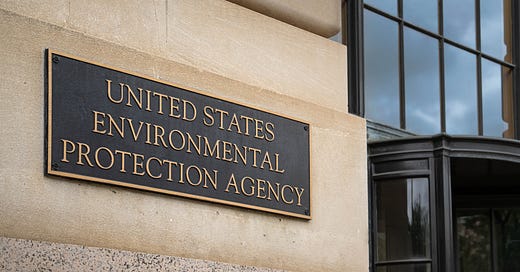Politicizing Science – The Project 2025 Call to Hamstring EPA Science
Thank you for tuning in to Environmental Protection News. Today’s featured post comes from EPN board member and former Acting Assistant Administrator of the Environmental Protection Agency’s (EPA) Office of Research and Development (ORD), Dr. Jennifer Orme-Zavaleta. Jennifer warns that Project 2025, aims to undermine EPA’s scientific mission by replacing technical experts with political appointees and limiting the agency's use of science in decision-making. These changes would politicize EPA’s work, dismantle environmental protections, and jeopardize the health of you and your family. - Steven Fantes, EPN Public Affairs Manager
Politicizing Science – The Project 2025 Call to Hamstring EPA Science
By: Jennifer Orme-Zavaleta
Mandate for Leadership- The Conservative Promise (referred to as Project 2025) is getting widespread attention as a conservative transition blueprint. Spearheaded by the Heritage Foundation and its partners and released in 2023, it outlines sweeping changes a more conservative administration would implement across the federal government, including the Environmental Protection Agency (EPA). Among the onerous plans for EPA are the elimination of its Office of Environmental Justice, downsizing the workforce and terminating new hires in what are deemed “low value programs,” replacing senior executive positions held by experienced career civil servants with political appointees, and increasing the number of political appointees in all agency offices. If implemented, these changes will impair EPA’s mission to protect human health and the environment and undermine the science that informs that mission.
Project 2025 calls into question EPA’s use of sound scientific principles. Science is foundational to how EPA meets its mission. Its Office of Research and Development (ORD) plays a key role in conducting research and providing an independent evaluation of scientific information to agency decision-makers that is unbiased and agnostic to any desired regulatory outcome. As a Day One priority, Project 2025 states that ORD should not conduct any current or planned activity that is not authorized by law. While some research is specifically called for by statute, such as the development of certain scientific methods under the Clean Air Act, much of ORD’s research is determined by congressional appropriations.
It is through this appropriations process that EPA receives the funding and authority to address environmental issues that are important to states, communities and tribes, and are critical to protecting our Nation’s resources including the air we breathe, the water we drink and play in, our communities, and all people and wildlife that depend on those resources. Among EPA’s essential scientific work is research to better understand, control, and remediate the potential risks posed by exposure to environmental contaminants. Based on ORD’s research, EPA reduced risks from the “forever” chemicals per- and polyfluoroalkyl substances (aka PFAS) and lead in drinking water; cleaned up these contaminants at Superfund sites; established more protective limits for fine particles in air, which are emitted by cars, power plants and various industries; used innovative tools to better protect the public from chemicals in commerce; and developed web-based tools people can access on their cell phones to monitor their exposure to wildfire smoke or the presence of a harmful algal bloom where they want to swim or fish.
Another stated Day One priority of Project 2025 is to freeze risk assessments conducted by ORD. The plan incorrectly claims without evidence that ORD assessments, which identify and characterize scientific data, use questionable science resulting in risk levels that have unacceptable economic impacts.
One of the more alarming features of Project 2025 is that it would assign no fewer than six senior political appointees to oversee and reform ORD research and science, roles currently filled by non-political, world-class scientific leaders, leading to the appearance of or actual political interference in the development of unbiased science for the agency. In addition, it would establish a science advisor who would report directly to the EPA administrator with an emphasis on management skills over scientific expertise. The project also calls for key science and risk assessment decision-making to be made solely by the administrator and other political appointees instead of more experienced senior career officials.
Project 2025 would also eliminate EPA’s use of a special hiring authority that other agencies also use to attract and recruit world class scientists to conduct research. In addition, it calls for changing the responsibilities of EPA’s Scientific Integrity Official and replacing scientific experts on EPA’s science advisory committees with people more friendly to a particular policy objective. Project 2025 foresees a renewed effort to limit what science EPA can use in developing risk assessments and in making regulatory decisions. And the list goes on. Much of the information provided to justify these changes represents special interest group perspectives and is plainly false, misleading, and contrary to the more than 50-year history of the agency.
Why does this matter? These changes will undermine the public’s trust in government. Scientific research is and should be an independent, transparent process for collecting information, testing theories, and answering questions. Implementation of Project 2025 would bias this process and limit what information is considered in the critical work of assessing risks and making regulatory decisions, jeopardizing public health and environmental protection, the very reason EPA exists.
About Dr. Jennifer Orme-Zavaleta: Jennifer served at EPA from 1981-2021. Over the course of her career, she worked in the Office of Toxic Substances and Office of Water in the areas of human health and ecological research, risk assessment, policy and regulation development, strategic planning, and program implementation. From 2017-2021, she served as the Principal Deputy Assistant Administrator in the Office of Research and Development and EPA’s Science Advisor. In 2021, Jennifer received EPA’s Distinguished Career Service Award as well as a Distinguished Executive Presidential Rank Award.






